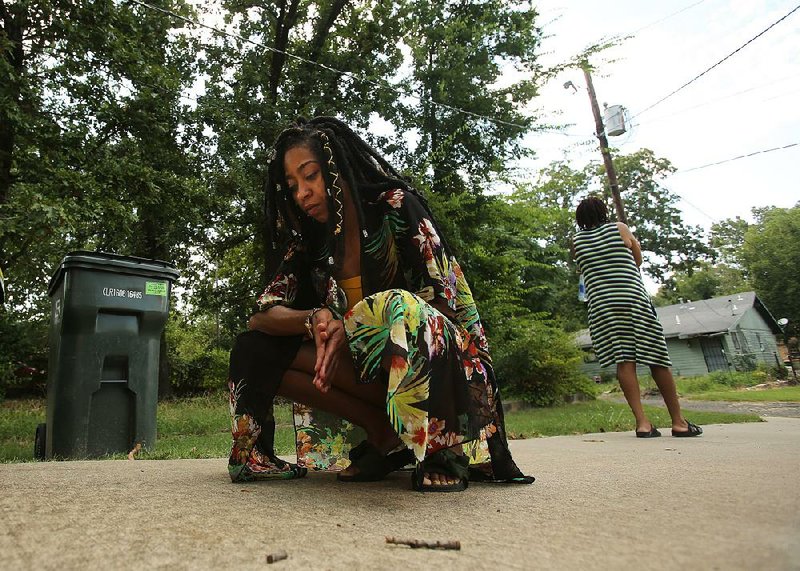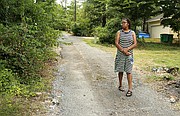Family members said Wiley Carr was an uncle, a brother, a fiance and a father figure to many on the night he was left bleeding near an alley in central Little Rock.
At approximately 7:30 p.m. on Jan. 16, Little Rock police officers responding to multiple ShotSpotter activations in the 5200 block of West 29th Street found Carr between South Harrison and South Van Buren streets.
Despite witnesses later saying they heard multiple gunshots and someone screaming, no one called 911. At the time, neighbors said they hear gunfire so often that they no longer report it, or that someone else always reports gunshots so there was no need to call police.
Carr was dead by the time officers arrived.
"I don't understand how you hear gunshots, how you hear somebody screaming and you don't call police," Carr's sister, Vicki Ashford, said when the family gathered Saturday at the spot where Carr was found. "I don't understand how they just left him here."
Almost seven months have passed since Carr died, and Ashford said family members know little more than they did on the night they learned he was murdered.
Homicide detectives knocked on Ashford's door that night, she recalled. At first, she was afraid. Why would police be at her home so late? Why were they in unmarked cars with nothing but blue lights to denote that they were officers? Before answering the door, she called each of her family members, wanting to know they were safe before she opened the door. She called Carr's fiancee, Natalia Kilgore, who said Carr had gone out.
Then she answered the door.
"When they said they were homicide detectives, my heart sank," she said. "Do you know how in movies sometimes, they're there but they aren't really there? That's how I felt. I could hear what they said, but I wasn't really there."
She learned that her brother was dead. She called her family and told them he'd been shot, killed, left in the street. But Ashford said it didn't feel real.
She called her daughter, Marika Collins, who was at church.
"He taught me how to tie my shoes," Collins said, her bright blue eyes filling up with tears as she spoke. "When I needed him, he was always there."
Collins said that while she was in church that night she got a news alert on her phone telling her someone had been killed near West 29th Street. Later, her mother called.
"My ears started popping," she said. "It was like I could hear the preacher, but I couldn't pay attention."
She has since disabled news alerts on her phone. She said she can't bear to think of another family going through what her family has endured.
For a long time Collins said she couldn't feel comfortable in her church.
"I just ... I was praying so hard for my grandfather, he was sick," she said. "I prayed for my uncle, too, but maybe I should have been praying for him more. I didn't know. He didn't know this was coming. ... But I remembered he wouldn't want us to feel like that. He would want us to think he was still here with us."
On the night he died, Kilgore said her fiance seemed nervous. Carr liked to be outside, to go on drives and see friends or family members. He'd been in the house all day, and she said she thought at first he was just antsy.
"When I walked in the door from work, he walked up, grabbed my face in his hands and said, 'I love you, Nat. Don't you forget it,'" Kilgore said. "He was pacing around the house and he just seemed, like, nervous."
Now she fears he knew something was coming.
"He had ... a secretive side, too," she said. "Whoever he met that night, he knew them. I know he did."
Family members described Carr as a tall man who smirked instead of smiled. He had long locks and a graying goatee, and he was funny. He was ready to help someone -- anyone -- at a moment's notice. But, he was direct, too. He never said more than you needed to know.
Perhaps if they knew more, Kilgore said, they'd know who killed him.
"He was a handsome man," she said, smiling widely. "He was the love of my life and my first love. There will never be another Wiley Carr for me."
Collins, Ashford and Kilgore agreed to meet with reporters as the seven-month anniversary of Carr's death draws near. Police need more information, they said; anything to help them find who killed Carr.
Little Rock police spokesman officer Eric Barnes said homicide detectives are asking anyone who may have witnessed suspicious activity on the day of Carr's death to contact them. A $10,000 reward is in place for information leading to the arrest and conviction of Carr's killer.
"I know some people are afraid of retaliation, but you can do it anonymously," Collins said. "If you don't do it for the money, just do it for this family. ... Those actions, they hurt. We're hurt because of this."
Collins said she once had a flat tire far from home off an interstate and called Carr. He drove out, realized she didn't have a car jack and drove back to southwest Little Rock to get her one.
"When we got back to my car, we realized my spare tire was flat, too," she said, laughing. "We couldn't win for losing, but he was right there willing to help. ... We have so many memories of him."
A few months back, Collins had another flat tire, and she reached for her phone to call Carr.
"But I couldn't," she said. "I can't call him. ... I keep thinking he's going to come driving up, playing his music loud like he always did. You could tell it was him when he'd come driving up because he'd have that music turned up. But it's not."
Instead, Collins said she's learned how to change her own tire. She's teaching her daughter, Kenny'Di Taylor, how to tie her shoes the same way Carr taught her.
"All we can do is keep talking about him," she said. "All we can do is try and figure out what happened. He's still a part of our life."
Metro on 08/05/2019

